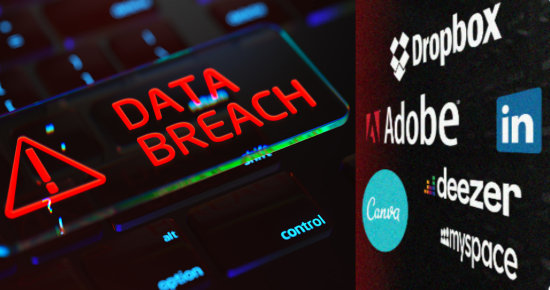The massive data leak – a wake-up call
Data breaches have become an unfortunate reality. However, occasionally, an incident occurs that surpasses all others in terms of scale and impact. The recent discovery of a massive data leak on the dark web has sent shockwaves through the cyber security community. With a staggering 26 billion records exposed, this breach has been dubbed the “Mother of all Breaches” (MOAB).
While some of the leaked data may be from previous breaches, the sheer volume and potential consequences of this leak should not be taken lightly. It serves as a wake-up call for both individuals and businesses to prioritise cyber security and take proactive measures to protect their data.
In this article, we delve into the details of the MOAB data leak, explore the implications for individuals and organisations, and provide actionable steps to protect your data.
The unprecedented scale of the MOAB data leak
This breach dwarfs any previous incident, with a mind-boggling 26 billion records comprising 12 terabytes of data. It includes sensitive information from numerous major companies and organisations. Some of the notable entities affected include:
- Tencent QQ, with 1.4 billion leaked records,
- LinkedIn, with 251 million records,
- X/Twitter with 281 million records,
- Adobe, with 153 million records,
- Dropbox with 69 million records,
- Canva, with 143 million records,
- MySpace with 360 million records,
- Weibo, with 504 million records,
- Deezer, with 258 million records,
- Additionally, various government organisations in the US, Brazil, Germany, the Philippines, and Turkey.
Understanding the composition of the MOAB Data Leak
While the MOAB data leak contains many records, it is essential to note that a significant portion of the data is not new but compiled from previous breaches and leaks.
According to researchers, around 70% of the records in the MOAB breach are duplicates or previously published data. However, the remaining 30% represents new and potentially unpublished data, making assessing the impact on individuals and organisations crucial.

Potential dangers and risks posed by the MOAB data leak
The implications of the MOAB are far-reaching and pose significant risks to individuals and businesses. Threat actors can leverage this aggregated data for various malicious purposes, including identity theft, sophisticated phishing schemes, targeted cyberattacks, and unauthorised access to personal and sensitive accounts. The leaked data contains credentials and a vast amount of sensitive information, making it highly valuable to cybercriminals.
Assessing the impact on you
If you are concerned about the safety of your personal information, there are steps you can take to assess the impact of the MOAB data leak on your accounts.
Cybernews, a leading cybersecurity research team, has developed a data leak checker designed to identify if your data was exposed in the MOAB breach. Enter your mobile number or email address into the search bar and click “Check Now” to determine if your data has been compromised.
Northdoor’s comment on the data leak
One crucial lesson from the MOAB is the importance of constant vigilance and password management. It is not enough to assume that past breaches have rendered the leaked data irrelevant. Cybercriminals can exploit this data to gain unauthorised account access if businesses fail to take necessary action.
Rob Batters, Director of Managed and Technical Services at Northdoor plc, emphasises the need for heightened cyber security measures: “The headline of 26 billion records being leaked on the dark web should be enough to wake up individuals and businesses alike. The fact that many result from previous breaches should be no comfort at all.”
Rob stresses that until a breach is identified, individuals and businesses often become complacent and neglect necessary security measures. Without changing passwords, implementing adequate monitoring systems, and maintaining proactive cyber defences, the leaked data can still provide cybercriminals with the necessary access they need.
The MOAB serves as a wake-up call, urging us all to take cyber security seriously. Share on XTaking action to protect yourself and your business
In light of the MOAB, taking immediate action to safeguard your personal and business information is essential. Here are some proactive steps you can take:
Change your passwords: Regularly update your passwords, especially for accounts that may have been affected by the leak. Use strong and unique passwords for each account, and consider employing a password manager to help generate and securely store complex passwords. Avoid reusing passwords across different platforms. Create complicated passwords using a combination of letters, numbers, and symbols.
Enable multi-factor authentication (MFA): Activate MFA wherever possible. This adds an extra layer of security to your accounts, requiring both a password and a second factor, such as a code sent to your phone, to access your account.
Remain vigilant against phishing attempts: Phishing attacks are a common starting point for cyberattacks. Be cautious of suspicious emails or messages that ask for personal information or direct you to questionable websites. When in doubt, refrain from clicking on links or providing sensitive information.
Check for password duplicates: Regularly check for duplicate passwords across your various accounts. Use a password manager to help you identify and update weak or reused passwords.
Check for previous breaches: Utilise tools like data breach checkers to determine if your email or personal information has been involved in previous data breaches. This information can help you identify potential vulnerabilities and take appropriate actions to secure your accounts.
Invest in managed security services: Consider partnering with a trusted managed security service provider. These experts can offer multi-layered security solutions, monitor potential threats, and ensure adherence to regulations. Managed security services provide comprehensive protection and can help mitigate the risks associated with data breaches.
Secure your devices: Ensure that all your devices, including smartphones, laptops, and tablets, are protected with strong passwords or biometric security measures. Keep your operating systems and software up to date to benefit from the latest security patches and enhancements.
The importance of cyber hygiene
The “Mother of all Breaches” is a stark reminder of the constant threat posed by cybercriminals. It underscores the need for individuals and businesses to prioritise cyber security and take proactive measures to protect their data. By following best practices and implementing robust security measures, you can significantly reduce the risk of falling victim to cybercrime.
Enhance your cyber security today with Northdoor.
Contact us via email or call 020 7448 8500 to find out more about our fast, fixed-cost security assessment workshops. Our expert consultants will conduct an in-depth technical review of your current cyber security stance and provide you with best-practice guidance.
